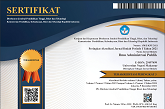Evaluation of the Sustainable Food Garden Program (P2L) During the Covid-19 Pandemic in Garut Regency
(1) Universitas Muhammadiyah Jakarta
(2) Magister Ilmu Administrasi, Universitas Muhammadiyah Jakarta
(3) Universitas Muhammadiyah Jakarta
(4) Universitas Muhammadiyah Jakarta
(*) Corresponding Author
DOI: https://doi.org/10.26858/jiap.v11i2.25019
Abstract
The purpose of this study was to analyze the evaluation of the Sustainable Food Garden (P2L) program during the Covid-19 pandemic in Garut Regency, implemented by the Food Security Agency (DKP) using the CIPP Evaluation Model. The Food Security Agency (BKP), the Ministry of Agriculture through the Food Security Service from 2010 to 2019 has implemented Sustainable Food House Area Activities (KRPL) through optimizing the use of yard land. Since 2020, it has been transformed into a Sustainable Food Garden (P2L). This study uses a qualitative method. The research is descriptive (descriptive research), that is, describes the actual situation in accordance with the object of research. Data collection techniques were carried out using observation techniques in five farmer groups/women farmer groups in Garut Regency and in-depth interviews with ten informants who were directly involved with the Sustainable Food Garden (P2L) program. The results showed that the Sustainable Food Garden Program (P2L) in Garut Regency had been running well and effectively starting from the submission, distribution of the assistance to farmer groups/KWT as well as assistance carried out by the local office and extension workers in the fields. Although in implementation there are still some obstacles faced in the field. During the COVID-19 pandemic, the P2L program was an alternative solution to fulfill family food security. The impact is felt by the farmer groups/KWT and the surrounding community. Through the P2L program.
Keywords
Full Text:
PDFReferences
abunifa. (2017). Basic Concepts and Strategies of Education Quality Assurance: As a Review of Education Quality Policy. Indonesian Journal of Education Management & Administration Review, 1(2), 107–118.
Aji, TS, & Sholihah, M. (2013). IMPACT OF SUSTAINABLE FOOD HOUSING PROGRAM (KRPL) ON HOUSEHOLD CONSUMPTION EXPENDITURE (Case Study in Pucangsari Village, Purwodadi District, Pasuruan Regency). AGROMIX, 4(2). https://doi.org/10.35891/AGX.V4I2.715
Albi Anggito, JS (2018). Qualitative research methodology - Albi Anggito, Johan Setiawan. In Ella Deffi Lestari (Ed.), CV . Footsteps. CV Trace. https://books.google.co.id/books?hl=id&lr=&id=59V8DwAAQBAJ&oi=fnd&pg=PP1&dq=sugiyono+kualitatif&ots=5HaxrvfyHu&sig=xrZDmZ0PfjZPrc3ML5SBkgy5konecpage&qredirv=yonocpage&y=qualitative
Anis, H. (2021). Government Policy in Implementing New Normal Post-PSBB Due to the Covid-19 Pandemic Outbreak. Lex Administratum, 9(4), 150–159.
Asmoro, BT, Utomo, AK, Chasanah, M., & Mahbubi, NM Al. (2020). ASSISTANCE PROGRAM FOR SUSTAINABLE FOOD HOUSE (KRPL) AT WARAKAWURI SEROJA HOUSING RT 24 SENGGURUH VILLAGE, KEPANJEN DISTRICT, MALANG REGENCY IN 2020. At-Tamkin: Journal of Community Service, 3(2). https://doi.org/10.33379/ATTAMKIN.V3I2.560
Citra Larasati, D. (2017). Evaluation of the “Sunset Policy” Innovation Program in Malang City to Reduce Arrears of Urban Land and Building Taxes. The Reformation, 7(1), 19–28.
Dye, TR (2011). Understanding Public Policy. Baski. https://scholar.google.com/scholar?hl=id&as_sdt=0%2C5&q=thomas+r+dye+public+policy+2011&btnG=#d=gs_cit&u=%2Fscholar%3Fq%3Dinfo%3A8Rw778eNST0J%3Ascholar.google. com%2F%26output%3Dcite%26scirp%3D0%26hl%3Did
Fentria, AR, Anantanyu, SA, & Lestari, EL (2021). Women Farmers' Attitudes towards the P2L (Sustainable Food Court) Program in Gunungkidul Regency. Indonesian Journal of Social Science, 2(9), 1443–1455. https://doi.org/10.36418/JISS.V2I9.402
Lines, RR, & Desfirani, L. (2021). POLICY EVALUATION OF THE NON-CASH FOOD ASSISTANCE PROGRAM IN HANDLING THE IMPACT OF THE COVID-19 PANDEMIC Musamus Journal of Public Administration, 4(1), 47–56.
Hidayat, D., Anisti, Purwadhi, & Wibawa, D. (2020). Crisis management and communication experience in education during the covid – 19 pandemic in Indonesia. Journal of Communication: Malaysian Journal of Communication, 36(3), 67–82. https://doi.org/10.17576/JKMJC-2020-3603-05
Khairu Nissa, N., Nugraha, Y., Finola, CF, Ernesto, A., Kanggrawan, JI, & Suherman, AL (2020). Data-Based Evaluation: Public Mobility Restriction Policy in Mitigating the Spread of COVID-19 in Jakarta. Journal of Intelligent Systems, 3(2), 84–94. https://doi.org/10.37396/jsc.v3i2.77
Meditama, RF, Wulandari, EC, Umah, NK, Azizah, N., Islam, U., & Malang, RR (2021). ASSISTANCE OF MSMES IN THE MANAGEMENT OF SUSTAINABLE FOOD FOODS RESULTS (P2L) INTO TRADITIONAL JAMU CELUP PRODUCTS IN SENGGURUH VILLAGE, MALANG REGENCY. At-Tamkin: Journal of Community Service, 4(1), 17–24. https://doi.org/10.33379/ATTAMKIN.V4I1.680
Moleong, & Lexy, J. (2004). Research Methodology. Rosdakarya Youth.
Nasution, Z. . (2021). Evaluation of the Covid-19 Handling Policy in the City of Surabaya: A Case Study of the PSBB Policy. Ganaya: Journal of Social Sciences And Humanities, 4(1), 98–115.
Oka, I., Darmawan, Dwi., Astiti, N. (2016). The success of the Sustainable Food House Area Program (KRPL) for the Women Farmers Group in Gianyar Regency. Journal of Agribusiness Management, 4(2), 133–146.
Pineleng, K., Minahasa, K., & Londa, VY (2020). Implementation of the Covid 19 Handling Policy in Sea Tumpengan Village, Pineleng District, Minahasa Regency. Journal of Public Administration, 6(96), 66–73.
Rani and Nur Elvira Yenistika Safarinda. (2020). Evaluation of Jogo Tonggo's Policy in Handling Covid-19 in Central Java Province. Journal of State Administration Students, 4(2), 8–15.
Saptana, nFN, Sunarsih, nFN, & Friyatno, S. (2013). Prospect of Sustainable Food House Area Model (M-KRPL) and Replication of KRPL Development. Agro-Economic Research Forum, 31(1), 67–87. https://doi.org/10.21082/FAE.V31N1.2013.67-87
Stufflebeam, D. (2001). Evaluation Models. New Directions for Evaluation, 2001(89), 7–98. https://doi.org/10.1002/EV.3
Tando, E. (2018). Optimizing the Utilization of the Yard through the Development of a Sustainable Food House Area Model (m-KRPL) in Supporting the Application of Organic Vegetable Cultivation Technology in Southeast Sulawesi. AGRORADIX: Journal of Agricultural Sciences, 2(1), 14–22. https://doi.org/10.52166/AGROTEKNOLOGI.V2I1.1281
William N Dunn. (2016). Public Policy Analysis - William N. Dunn - Google Books (5th ed.). Routledge. https://books.google.co.id/books?hl=id&lr=&id=lPE5CgAAQBAJ&oi=fnd&pg=PP1&dq=william+dunn&ots=GsK1ZVwrk2&sig=pQiI6PA_6Cv3si35BG9vL#x4drtk=duq&=
Article Metrics
Abstract view : 164 times | PDF view : 66 timesRefbacks
- There are currently no refbacks.
Copyright (c) 2022 Yuma Iza, Evi Satispi

This work is licensed under a Creative Commons Attribution 4.0 International License.
Diterbitkan oleh:
Program Studi Ilmu Administrasi Publik
Program Pascasarjana Universitas Negeri Makassar
JIAP Index By:

This work is licensed under a Creative Commons Attribution 4.0 International License.









